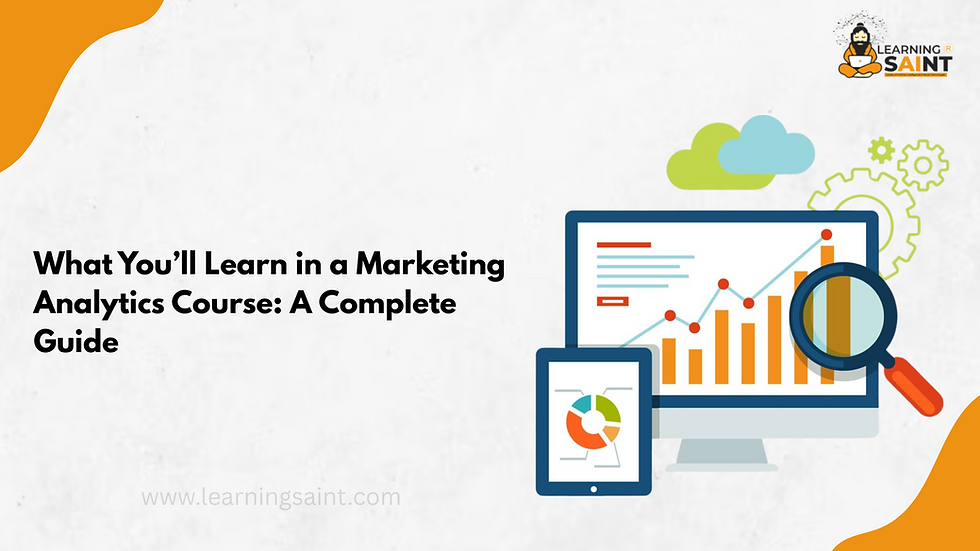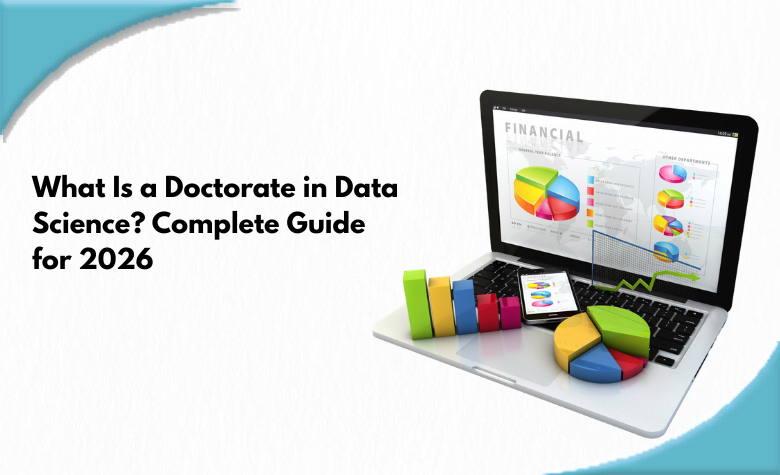What You’ll Learn in a Marketing Analytics Course: A Complete Guide
- May 12, 2025
- 4 min read
Updated: May 17, 2025
In today’s data-driven world, marketing is no longer just about creativity—it's about strategy, precision, and insights. Businesses are increasingly relying on marketing analytics to drive campaigns, understand customer behavior, and optimize their return on investment (ROI). A marketing analytics course equips professionals with the tools and techniques needed to harness the power of data for smarter decision-making.
If you're considering a marketing analytics course, this complete guide will walk you through what you'll learn, how it can benefit your career, and why it's a smart investment for aspiring marketers, analysts, and business professionals.
What is Marketing Analytics?
Marketing analytics is the practice of measuring, managing, and analyzing marketing performance to maximize effectiveness and optimize ROI. It involves collecting data from marketing campaigns, customer behavior, and digital interactions to generate insights.
A marketing analytics course helps learners interpret this data to improve strategic decision-making, identify trends, and predict customer behavior. This leads to better marketing outcomes and increased business performance.
Why Choose a Marketing Analytics Course?
Here are some compelling reasons to pursue a marketing analytics course:
High Demand: Companies are looking for professionals skilled in marketing analytics training to manage their growing data needs.
Data-Driven Roles: The marketing landscape is shifting toward roles that require strong analytical skills.
Career Growth: Jobs in data and analytics are among the fastest-growing roles in the industry.
Improved ROI: Professionals can use marketing data to increase customer retention, lead generation, and conversion rates.
Whether you're a beginner or a seasoned marketer, enrolling in a marketing analytics course ensures you're equipped with the latest skills and insights to stay competitive.
Core Concepts Covered in a Marketing Analytics Course
A comprehensive marketing analytics course covers a wide range of topics to help learners understand, analyze, and interpret marketing data. Key modules typically include:
1. Introduction to Marketing Analytics
Understanding the role of analytics in marketing
Overview of data-driven marketing strategies
2. Customer Segmentation
Identifying and targeting customer segments
Personalization through data insights
3. Campaign Performance Measurement
Evaluating the effectiveness of marketing campaigns
Using KPIs and metrics for tracking success
4. Web and Social Media Analytics
Analyzing digital footprints using tools like Google Analytics
Social media engagement and trend analysis
5. Predictive Analytics and Forecasting
Using historical data to forecast trends
Customer lifetime value (CLV) prediction models
6. A/B Testing and Experimentation
Designing and evaluating marketing experiments
Optimizing campaigns based on test results
7. Data Visualization and Reporting
Presenting insights through dashboards
Using visualization tools for impactful storytelling
Skills You’ll Gain Through Marketing Analytics Training
By enrolling in a marketing analytics course, you’ll develop a variety of technical and analytical skills that are in high demand. These include:
✔️ Analytical Thinking
Learn how to critically assess data to make strategic decisions.
✔️ Data Interpretation
Understand how to turn raw data into meaningful insights.
✔️ Marketing Strategy Alignment
Link data insights directly to marketing and business goals.
✔️ ROI Measurement
Evaluate the cost-effectiveness of your marketing spend.
✔️ Data-Driven Campaign Management
Plan and execute campaigns backed by accurate data insights.
These skills will not only boost your efficiency but also make you an invaluable asset to any marketing team.
Tools and Technologies You’ll Learn
A strong marketing analytics training program includes hands-on experience with industry-standard tools. These may include:
Google Analytics: To track website traffic and user behavior
Excel & SQL: For managing and querying marketing data
R or Python: For advanced statistical analysis and modeling
Power BI / Tableau: For creating insightful dashboards and visualizations
CRM Tools: Such as Salesforce or HubSpot for managing customer data
Gaining proficiency in these tools during a marketing analytics course will ensure you're job-ready upon completion.
Career Benefits of a Marketing Analytics Course
Completing a marketing analytics course can open doors to exciting and well-paying roles in marketing and data science. Here are a few career benefits:
🚀 Increased Job Opportunities
As businesses turn to data-driven solutions, there’s a growing demand for professionals who can interpret and act on marketing data.
📈 Higher Salary Potential
Professionals with marketing analytics training often command higher salaries due to the value they bring in optimizing marketing investments.
🧠 Cross-Functional Expertise
Analytics skills are transferable across industries and departments, making you a versatile team member.
💼 Roles You Can Apply For:
Marketing Analyst
Data Analyst
Digital Marketing Manager
Performance Marketing Specialist
Customer Insights Manager
These positions require the ability to merge marketing knowledge with analytical skills—exactly what a marketing analytics course offers.
Who Should Take a Marketing Analytics Course?
A marketing analytics course is suitable for:
Marketing Professionals: Who want to deepen their analytical capabilities.
Data Analysts: Seeking to specialize in marketing-related data interpretation.
Entrepreneurs and Business Owners: Who want to understand customer behavior and optimize their marketing efforts.
Students and Graduates: Looking to enter the field of data-driven marketing.
Career Switchers: Professionals from non-marketing backgrounds transitioning into tech-enabled roles.
Whether you're looking to advance in your current role or pivot your career, marketing analytics training provides a structured path forward.
Final Thoughts
In today’s competitive marketing landscape, decisions based on intuition alone are no longer enough. Businesses need professionals who can interpret complex data, evaluate campaign performance, and offer insights that drive revenue. That’s where a marketing analytics course comes in.
By enrolling in a course, you gain not just theoretical knowledge but also practical skills in marketing data analysis, predictive modeling, and reporting. You’ll learn to use industry-leading tools and apply your knowledge in real-world scenarios—making you more valuable to employers and more effective in your role.
Whether you’re just starting your career or looking to level up, investing in a marketing analytics course is a smart move toward becoming a leader in the data-driven marketing world.






Comments